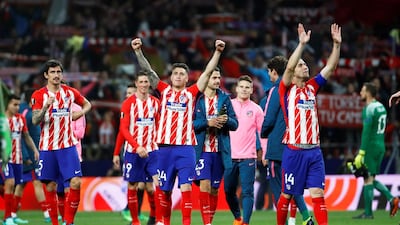“We’ve got no chance here,” sighed Terry, a 42-year-old Arsenal fan, as he gazed over Madrid’s skyline towards the snow-capped mountains from a terrace in the sunny Spanish capital. “We’re just mates here for a laugh.”
The four of them, all home and away Arsenal fans, nodded. They had come to Madrid for the semi-final second leg of the Europa League game in hope rather than expectation after a 1-1 draw against Atletico’s 10 men in the first leg. They had been worn down by sustained attrition at the club they love, by the civil strife over Arsene Wenger’s decline into being a threat to nobody but the sanity of Arsenal fans.
All thought it was right that the Frenchman was relieved of his position after 22 years. Several mentioned Diego Simeone as the man they would like to take over, but it would be easier to beat Atletico in their fortress than to extract a manager who is loved and successful from a club which has become a giant.
_____________
Read more:
Arsene Wenger defends 'victimised' Mesut Ozil after Arsenal's defeat to Atletico Madrid
Wenger's last trip to Old Trafford full of nostalgia as Arsenal face up to an uncertain future
_____________
“And he can bring Antoine Griezmann too,” came another wishful comment. These Arsenal fans weren’t for online hysterics, but they knew their place in football’s current pecking order.
They may support the biggest club in Europe’s biggest, richest city, but Madrid’s big two easily outperform all of London’s five top-flight clubs combined.
Arsenal’s £419 million (Dh2.1 billion) revenue dwarfs that of Atletico’s £234m. Posters of Arsenal’s veterans’ team forthcoming match against Real Madrid are everywhere around Madrid underlying their status as a top international draw.
Yet the rojiblancos consistently perform, princes to the kings of Real Madrid in what has become world football's capital for the last five years. Real Madrid have reached four of the last five Uefa Champions League finals and will face Liverpool as they attempt to become the first club to win the European Cup three successive times since Bayern Munich in the mid 1970s.
Two of those Champions League victories have been in finals against neighbours Atletico, who have also won two Europa Leagues since 2010. The first Europa League victory, led by David de Gea, Diego Forlan and Sergio Aguero in 2010, transformed the mentality of the club from losers to winners.
The addition of Simeone as manager in 2011 added iron to their already formidable fist. When Wenger steps down, Simeone will become the longest serving manager at a major European club.
After beating Arsenal, Atletico have reached a fifth European final in nine years. In addition, they have won two European Super Cups since 2010, while Madrid have won three.
Atletico and Real have been in nine major European finals in nine years. No other city comes close; no country compares to Spain’s continued domination of European trophies, with seven of the last 12 Champions League and Europa League winners coming from the country with a population half the size of Germany and an economy 70 per cent the size of England’s.
Atletico have risen to world football’s top table and their move to their new Wanda Metropolitano home – which will stage the 2019 Champions League final - has also been a success. Average crowds are up 10,000 to 55,000; they just needed to start making history as they did in the fraying but hugely atmospheric Calderon.
In the words of the suspended but ever animated Simeone, who watched from the stands: “We started writing history here tonight.” And what an atmosphere it was, too.
The Metropolitano is closer in aesthetics to Arsenal’s Emirates and the acoustics are likely similar, but the atmosphere is so vastly superior, the fans so much louder, that there’s no comparison.
Arsenal’s defence could be flimsy, but while they didn’t play badly, it was not a good night for Wenger’s men. They had more possession, but save for a "We’re by far the greatest team, the world has ever seen" chant at the start of the game, the 3,500 Arsenal fans struggled to make themselves heard from high up on he fourth tier in the earsplitting din of Atleti’s fortress.
They had been charged €100 (Dh440) for a ticket before their club stepped in and subsidised the cost. Spanish clubs continue to rip-off visiting football fans.
Arsenal, who had not won in their previous seven visits to Spain, failed to do what 75 per cent of teams do and breach Spain’s best defence. As the warrior-like Uruguayan Diego Godin out it: “That’s what we’re there for, to defend.”
The suited Wenger stood alone on the side, watching helplessly as his last hopes of a trophy with Arsenal, one which he could have picked up in his native France against Marseille, slipped away. Diego Costa’s strike just before half-time gave the Spaniards a 2-1 advantage and Costa, often derided in song by Arsenal fans, was strong as he charged again through Arsenal’s defence after being set up by Antoine Griezmann.
It was a sorry sight for Wenger, a proud man and once great manager seeing his hopes crushed once more. There would be no happy end to his time at Arsenal.
“I’m sad tonight,” said Wenger. “Sad and very disappointed. He looked it too as his final season at the club disappeared into nothingness, the fans into the vast Madrid metro for the long journey back into the centre of the city. Those Arsenal fans, in contrast, have next season to look forward to, hopeful of new life after Wenger.


